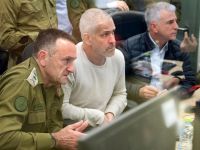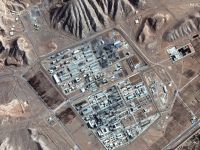Jubilant southern Lebanese residents on Thursday began their first full day of life in the hands of their own police and military, after more than 20 years of Israeli occupation.
Local residents have hailed Wednesday's entry of 1,000 police and troops as the first real sign of Beirut's resumption of control since the end of the Israeli occupation on May 24th.
"Welcome, our army, the proud defenders of our country," shouted Marie, a 55-year-old woman from the Christian village of Qleiya.
"We've regained hope by seeing our soldiers arrive from Beirut," said Siham, 32, who joined a dozen others in the Christian village of Bourj al-Moulouk waving small Lebanese flags and throwing rice at the troops.
"Now we are going to sleep peacefully and maybe our loved ones and friends who fled to Israel will feel reassured and decide to come back instead of leading miserable lives there."
Across the border in Israel, Prime Minister Ehud Barak, who masterminded the Israeli withdrawal, voiced his satisfaction, calling the handover of control a model for the future.
"The optimistic assessments turned out completely true... and the situation has stabilized," Barak told a group of military correspondents.
The troops and police moved south from Beirut before sunrise aboard armored transports, tanks and jeeps. Some 260 installed themselves at Bent Jbeil to the south, the largest Shiite Muslim town of the region.
Most headed for Marjayoun in the east, to take over the former barracks of Israel's surrogate militia, the South Lebanon Army (SLA), whose collapse prompted the hasty Israeli withdrawal.
Even before the Israeli occupation, the Lebanese army had lost control in the south when it split along religious lines with the outbreak of the country's civil war.
UN envoy Terje Roed-Larsen said he was "extremely satisfied" with Wednesday's events, adding that it was an important step in re-establishing Lebanese authority and sovereignty in line with United Nations resolutions.
UN troops are posted some 1,500 meters from the Fatima Gate, though they are closer to the border in other places.
A spokesman said this week they would be taking up additional positions soon but did not say where.
But the joint force will not be keeping order on the border itself, specifically at the Fatima Gate, where almost daily for the past 10 weeks Lebanese and other Arabs have gathered to lob stones and the occasional Molotov cocktail over the border fence at Israeli troops.
The Israelis have responded with rubber bullets or live rounds, wounding at least 17 people so far, four of them in the same day this week, prompting renewed warnings of a flare-up of violence.
Israeli chief of staff General Shaul Mofaz said Tuesday Israel will hold Lebanon and its army responsible for any clashes along the border -- MARJAYOUN, Lebanon (AFP)
© 2000 Al Bawaba (www.albawaba.com)







